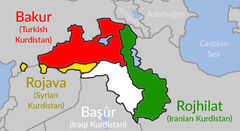Kurdistan
 The modern division of Kurdistan | |
| Interest of | • Henri Barkey • Paul Moran |
Kurdistan is an historical region of the Middle East extending to Iran, Iraq, Syria and Turkey.[1]
According to the CIA Factbook, Kurdistan is home today to some 28 million Kurds, of whom 14.5 million are in Southeastern Turkey ("Bakur" or "Northern Kurdistan"), 6 million in Northwestern Iran ("Rojhilat" or "Eastern Kurdistan"), about 5 to 6 million in Northern Iraq ("Başûr" or "Southern Kurdistan") and fewer than 2 million in Northern Syria ("Rojava" or "Western Kurdistan").[2][3][4]
Some Kurdish nationalist organisations seek to create an independent nation state consisting of some or all of these areas with a Kurdish majority, while others campaign for greater autonomy within the existing national boundaries.[5][6]
Invasion by Turkey
In January 2018, Turkish troops launched a ground invasion of Afrîn, a Kurdish enclave in Northern Syria/Rojava, to clear Turkey’s border of fighters who Ankara regards as terrorists posing a threat to its own territorial integrity.[7] Turkish officials said the ground invasion was being conducted in conjunction with Turkish-backed members of the Free Syrian Army (FSA) rebel group. Kurdish officials and residents in the Afrîn region reported heavy clashes on several fronts along the Turkish-Syrian border, with artillery fire and air strikes. The Turkish border towns of Reyhanli and Kilis were hit with retaliatory rocket fire, killing one person and injuring 32, according to Turkish media.[8]
SSK reaction
Scottish Solidarity with Kurdistan (SSK) was quick to react:
- “Turkey’s invasion of Afrîn shows what a farce NATO is. The YPG-led Syrian Democratic Forces (SDF) are not just the only serious secular, democratic force in Syria, they are a key ally of the UK and the US. Washington and London were more than happy to support the SDF when they alone took the fight to Daesh and liberated hundreds of thousands of people from their control but now they stand idle whilst another NATO member begins a vicious campaign to destroy the one group with a peaceful roadmap for Syria’s future.
- "Let’s make no mistake, this invasion is motivated by the Turkish government’s obsessive hatred of the Kurdish people and their fear of an autonomous, Kurdish-led administration on their border. The international community must stand against Turkey’s invasion of Afrîn and make clear our solidarity with the democratic, feminist revolution taking place in Northern Syria/Rojava.”[9]
Related Documents
| Title | Type | Publication date | Author(s) | Description |
|---|---|---|---|---|
| Document:How did the US rename a terror group to work with it | Article | 24 January 2018 | Murat Yetkin | So Mr Tillerson, contrary to what CENTCOM and Brett McGurk keep telling you, the Syrian Democratic Forces are not a “truly multi-ethnic” group of freedom fighters uniting against ISIL barbarism. The handful of Arab tribes in the SDF are there for cosmetic purposes only, as part an effort to cover up cooperation between US forces and a group that your administration official designates a “terrorist group.” |
| Document:Washington Wants Syria's Oil | Article | 30 August 2017 | Anna Jaunger | The future of Syria and its geopolitical strategic equation will depend on who controls the oil-rich region of Deir al-Zor. |
References
- ↑ "Why should Kurdistan become an independent country?"
- ↑ Kurdish Awakening: Nation Building in a Fragmented Homeland, (2014), by Ofra Bengio, University of Texas Press
- ↑ The Columbia Encyclopedia, Sixth Edition 2005
- ↑ "The modern division of Kurdistan"
- ↑ The Kurdish Conflict: Aspirations for Statehood within the Spirals of International Relations in the 21st Century
- ↑ Hamit Bozarslan “The Kurdish Question: Can it be solved within Europe?”, page 84 “The years of silence and of renewal” in Olivier Roy, ed. Turkey Today: A European Country?.
- ↑ "A Turkish attack on Afrin could spark a full-fledged war in Northern Syria"
- ↑ "Turkey invades Kurdish enclave in Syria"
- ↑ "The Importance of Afrîn"